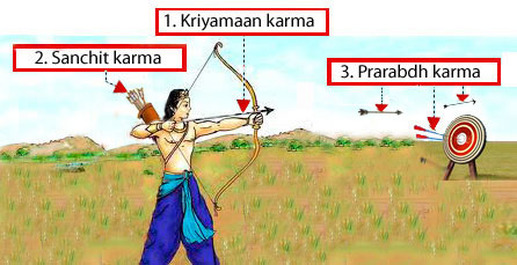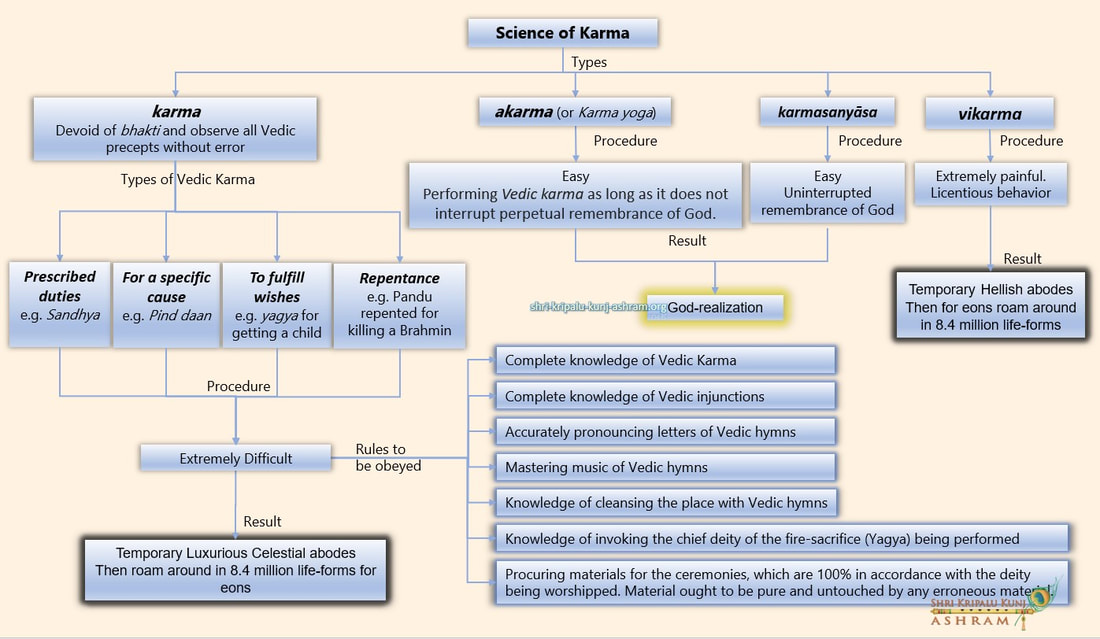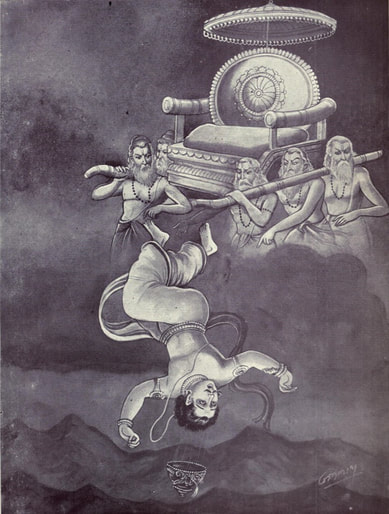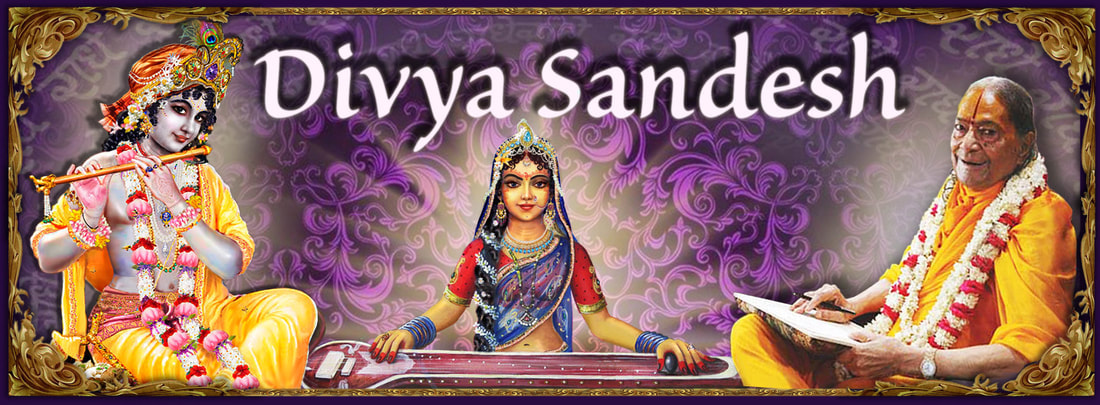Whatever we do in our life is known as action or karma(कर्म). These actions are classified in different ways based on different criterion. Those criterion are discussed below.
Categories of Karma
Karma are divided into three categories; together they are referred to as trikarma.
Kriyamaan karma (क्रियमाण कर्म) is every action performed in wakeful state yield fruits. These can be purely mental or mental plus physical actions. These actions are called kriyamaan karma. In other words, when we choose to perform any action according to our present situation, that is called kriyamaan karma. We get the recompense of our every action of this kind. We undergo consequences of some of them in this life for example eating food fills up our stomach. Kriyamaan karma are like the arrows that are on the bow to be shot. We have the choice of deciding when, at whom and where we shoot them.
|
Sanchit Karma (संचित कर्म) is the stock pile of fruits that we have not yet borne.
God is our real Father and is extremely merciful. He does not let us undergo fruits of all kriyamaan karma right away. They are stored in our mind as Sanchit Karma. We undergo consequences of some of them in this life while others are kept in the annals for other lifetimes (like the arrows in the quiver). For these karma one will receive the fruits and any of the following lives. |
Prarabdh karma (प्रारब्ध कर्म) are the fruits of actions of past life times that are destined to be borne in the current life time.
Out of all the karma performed in previous lives (sanchit karma) only a handful are selected for which one has to bear the fruits in this lifetime. Those handful of karm are called prarabdh karma. These are also called fate or destiny. Thus, in a lifetime, we receive fruits of deeds performed in many of our previous lifetimes. In other words destiny is not determined by just one previous life or present life only. These are arrows that have already been shot.
Out of all the karma performed in previous lives (sanchit karma) only a handful are selected for which one has to bear the fruits in this lifetime. Those handful of karm are called prarabdh karma. These are also called fate or destiny. Thus, in a lifetime, we receive fruits of deeds performed in many of our previous lifetimes. In other words destiny is not determined by just one previous life or present life only. These are arrows that have already been shot.
There are five things that are already decided for us according to our destiny. They are;
Apart from these 5 predetermined things, every human being is independent to perform any action according to his own free will.
- Lifespan: How long will one live
- Profession: The occupation one will pursue to earn a living
- Wealth: Amount of wealth one will have
- Education: Highest degree attained. How much one learns while earning those degrees depends on the effort put into it.
- Death: mode of death
Apart from these 5 predetermined things, every human being is independent to perform any action according to his own free will.
आयुः कर्म च वित्तं च विद्या निधनमेव च। पंचैत्यान्यपि सृज्यन्ते गर्भस्थस्यैव देहिनः ॥
हितोपदेश
Āyuḥ karma ca vittaṁ ca vidyā nidhanmēva ca. Pan̄caityān'yapi sr̥jyantē garbhasthasyaiva dēhinaḥ.
Hitōpadēśa
Above mentioned things are predestined. Still since we do not know what our destiny holds for us we ought to always strive to do the very best in life. When something is predestined we get it (or lose it) without any desire or expending any effort. A lazy person might do nothing to progress in life yet blame his destiny. But after knowing how the destiny is determined one has no one to blame and no reason to get upset for any loss or failure. As these are fruits of our own past or present actions we should perform good actions only for our own bright future.
However, if we objectively evaluate our life we might realize that most of the times most of the things in our life are quite satisfactory and only occasionally we encounter hardships. Yet many of us blame God and others for those times. In order to make our life happy and blessed, we ought to practise gratefulness to God for all the aspects. This virtuous circle further grows happiness and blessedness in our life.
However, if we objectively evaluate our life we might realize that most of the times most of the things in our life are quite satisfactory and only occasionally we encounter hardships. Yet many of us blame God and others for those times. In order to make our life happy and blessed, we ought to practise gratefulness to God for all the aspects. This virtuous circle further grows happiness and blessedness in our life.
Based on Faculty Used to Perform the Karma
These karma can be performed by engaging various faculties. Based on faculty used to perform the karma they are divided into in three different categories namely -
Mental Actions
These are the actions performed mentally or simply put thoughts (मानसिक कर्म), but are not accompanied by physical action. Examples are sitting idly and thinking or actions performed in our dreams when the senses are not cognizant. Without the senses the mind performs numerous possible and even impossible actions.
Mental plus Physical Actions
These are those karma when one is mentally engaged and physical actions accompany it. These are performed in wakeful consciousness state for example, reading this article falls in this category.
Physical Actions
Physical actions are those where one puts on an act while hiding one’s inner feelings. For example, you might abhor some person; yet motivated by some personal gain, you pretend to be happy to see him. You extend a warm welcome even though you were upset and unwilling to welcome him. In this case, welcoming the person is a mere physical action and the actual feeling for the person is the work of the mind.
God only takes note of the thoughts in your mind and disregards your physical activity. Thus, any physical action cannot deliver a Jeev from Maya. Mind alone is the cause of suffering or liberation. We do not get any result of actions performed in our dreams or our physical actions.
Human body has been given so that we can perform karma to attain the aim of life. Those karma can be broadly classified into 4 groups. The process and the outcomes vary greatly. So please pay close attention to the rest of this article.
|
Karmakand (कर्मकान्ड) specifies performance of those actions, which are written in the Vedas according to the classification of four castes.
वेद प्रणिहितो ह्यध्र्मस्तद्विपर्ययः ।
There is no trace of Bhakti in this kind of action.
Out of 100,000 Vedic hymns 80,000 hymns are about righteous actions (Karma) based on varna and ashram. The Vedas divide all human beings into four varna (castes) depending on their innate skills and four ashram, thus a total of 16 classes. Those 80,000 vedic hymns are dos and don'ts for 16 classes. Absolute implementation of the commands of the Vedas in this respect is called karma or Karmakand. Such a life style is called varnashram dharm. Karmakand includes four kinds of actions. |
Neimittik karma (नैमित्तिक कर्म) are causal actions, which are performed for some special purposes. Examples of such karma are fire sacrifices Vedic injunctions to get absolved of a sin, for the purification of the house or environment.
Kamya karma (काम्य कर्म) are actions performed to fulfill a desire. For instance, performing yagya or fire sacrifice to bring auspiciousness to a new born child, or to have good crops.
Prayashchit karma (प्रायश्चित कर्म) are the actions of atonement. In performance of any of the aforementioned karma if there was any error then these karma of repentance are performed.
The main condition in Karmkand is that that there should not be slightest deviation from the method prescribed in Vedas and other Smritis. If a person perfectly abides by all the rules and performs all these types of karma then after death he is sent to swarg to enjoy the fruits of his good deeds for a finite time. Once fruits of virtuous deeds are exhausted he is bound to come back in the same cycle of birth and death.
Karma Yog (कर्मयोग) is also called akarma. In this type of karma one constantly remembers God while performing the righteous deeds depicted in the Vedas.
कर ते कर्म करहु विधि नाना । मन राखहु जहाँ कृपा निधाना ।
In this category of karma total emphasis is given to devotion, yet a karma yogi performs actions in the world as long as long as they are not a hindrance in his devotion. Their reward is God-realization since they remember God only. It type of action is admirable.
Karma Sanyas (कर्मसन्यास) is a kind of action in which one remembers only God, regardless and totally gives up observing the commands of the Vedas. Thus he also gets liberation from Maya and receives Divine Bliss. This kind of action is also regarded as admirable.
Vedas advise on two things DOs and Don'ts. DOs are like speak the truth or honor others. Don’ts are like stealing, hurting others etc. Vedas have 80,000 hymns describing the dos of a virtuous life. When one ignores the DOs and instead performs prohibited actions then they are called Vikarma (विकर्म). So Vikarma means NOT abiding by the Vedic rules aka following the path prohibited by the Vedas.
This kind of karma is reprehensible. The performer of this kind of action is called Vikarmi and goes to narak (see Figure 1).
Having read about the outcomes of the various karma if you are a little confused, let me tell you "You are not alone". In our formative years many of us led to believe that performing Vedas prescribed Karmkand is virtuous deed called punya karma. But reading this you might have figured out that doing karmkand is extremely difficult and it increases the karmic bondage. So you might now be wondering then "Which actions are virtuous actions?"
Good question. Please continue to read the next section
This kind of karma is reprehensible. The performer of this kind of action is called Vikarmi and goes to narak (see Figure 1).
Having read about the outcomes of the various karma if you are a little confused, let me tell you "You are not alone". In our formative years many of us led to believe that performing Vedas prescribed Karmkand is virtuous deed called punya karma. But reading this you might have figured out that doing karmkand is extremely difficult and it increases the karmic bondage. So you might now be wondering then "Which actions are virtuous actions?"
Good question. Please continue to read the next section











